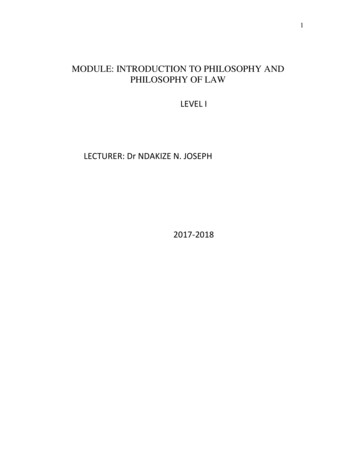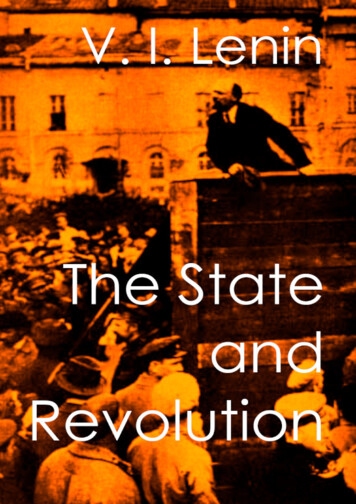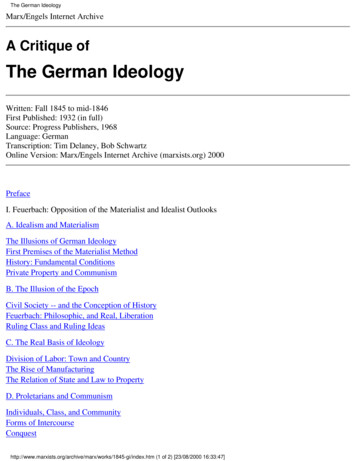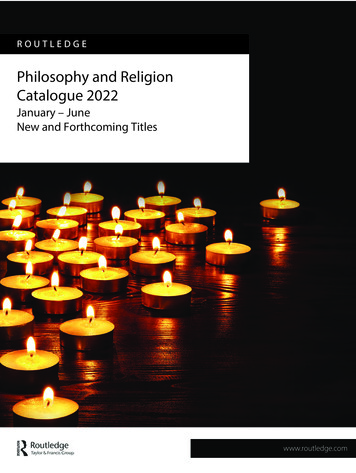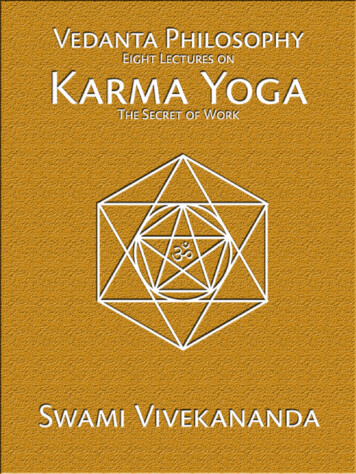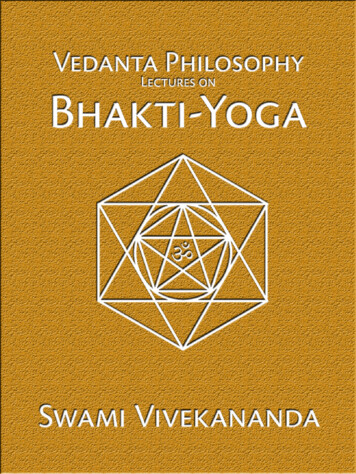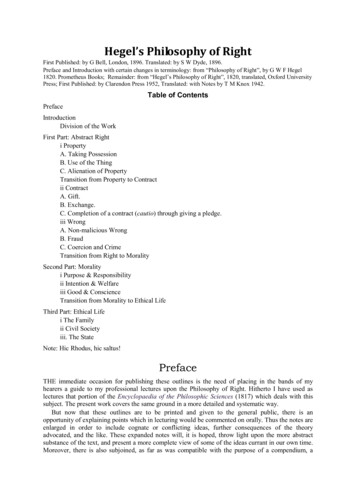
Transcription
Hegel’s Philosophy of RightFirst Published: by G Bell, London, 1896. Translated: by S W Dyde, 1896.Preface and Introduction with certain changes in terminology: from “Philosophy of Right”, by G W F Hegel1820. Prometheus Books; Remainder: from “Hegel’s Philosophy of Right”, 1820, translated, Oxford UniversityPress; First Published: by Clarendon Press 1952, Translated: with Notes by T M Knox 1942.Table of ContentsPrefaceIntroductionDivision of the WorkFirst Part: Abstract Righti PropertyA. Taking PossessionB. Use of the ThingC. Alienation of PropertyTransition from Property to Contractii ContractA. Gift.B. Exchange.C. Completion of a contract (cautio) through giving a pledge.iii WrongA. Non-malicious WrongB. FraudC. Coercion and CrimeTransition from Right to MoralitySecond Part: Moralityi Purpose & Responsibilityii Intention & Welfareiii Good & ConscienceTransition from Morality to Ethical LifeThird Part: Ethical Lifei The Familyii Civil Societyiii. The StateNote: Hic Rhodus, hic saltus!PrefaceTHE immediate occasion for publishing these outlines is the need of placing in the bands of myhearers a guide to my professional lectures upon the Philosophy of Right. Hitherto I have used aslectures that portion of the Encyclopaedia of the Philosophic Sciences (1817) which deals with thissubject. The present work covers the same ground in a more detailed and systematic way.But now that these outlines are to be printed and given to the general public, there is anopportunity of explaining points which in lecturing would be commented on orally. Thus the notes areenlarged in order to include cognate or conflicting ideas, further consequences of the theoryadvocated, and the like. These expanded notes will, it is hoped, throw light upon the more abstractsubstance of the text, and present a more complete view of some of the ideas currant in our own time.Moreover, there is also subjoined, as far as was compatible with the purpose of a compendium, a
number of notes, ranging over a still greater latitude. A compendium proper, like a science, has itssubject-matter accurately laid out. With the exception, possibly, of one or two slight additions, itschief task is to arrange the essential phases of its material. This material is regarded as fixed andknown, just as the form is assumed to be governed by well-ascertained rules. A treatise in philosophyis usually not expected to be constructed on such a pattern, perhaps because people suppose that aphilosophical product is a Penelope’s web which must be started anew every day.This treatise differs from the ordinary compendium mainly in its method of procedure. It must beunderstood at the outset that the philosophic way of advancing from one matter to another, the generalspeculative method, which is the only kind of scientific proof available in philosophy, is essentiallydifferent from every other. Only a clear insight into the necessity for this difference can snatchphilosophy out of the ignominious condition into which it has fallen in our day. True, the logicalrules, such as those of definition, classification, and inference are now generally recognised to beinadequate for speculative science. Perhaps it is nearer the mark to say that the inadequacy of the ruleshas been felt rather than recognised, because they have been counted as mere fetters, and thrown asideto make room for free speech from the heart, fancy and random intuition. But when reflection andrelations of thought were required, people unconsciously fell back upon the old-fashioned method ofinference and formal reasoning. In my Science of Logic I have developed the nature of speculativescience in detail. Hence in this treatise an explanation of method will be added only here and there. Ina work which is concrete, and presents such a diversity of phases, we may safely neglect to display atevery turn the logical process, and may take for granted an acquaintance with the scientific procedure.Besides, it may readily be observed that the work as a whole, and also the construction of the parts,rest upon the logical spirit. From this standpoint, especially, is it that I would like this treatise to beunderstood and judged. In such a work as this we are dealing with a science, and in a science thematter must not be separated from the form.Some, who are thought to be taking a profound view, are heard to say that everything turns uponthe subject-matter, and that the form may be ignored. The business of any writer, and especially of thephilosopher, is, as they say, to discover, utter, and diffuse truth and adequate conceptions. In actualpractice this business usually consists in warming up and distributing on all sides the same oldcabbage. Perhaps the result of this operation may be to fashion and arouse the feelings; though eventhis small merit may be regarded as superfluous, for “they have Moses and the prophets: let them hearthem.” Indeed, we have great cause to be amazed at the pretentious tone of those who take this view.They seem to suppose that up till now the dissemination of truth throughout the world has beenfeeble. They think that the warmed-up cabbage contains new truths, especially to be laid to heart atthe present time. And yet we see that what is on one side announced as true, is driven out and sweptaway by the same kind of worn-out truth. Out of this hurly-burly of opinions, that which is neithernew nor old, but permanent, cannot be rescued and preserved except by science.Further, as to rights, ethical life, and the state, the truth is as old as that in which it is openlydisplayed and recognised, namely, the law, morality, and religion. But as the thinking spirit is notsatisfied with possessing the truth in this simple way, it must conceive it, and thus acquire a rationalform for a content which is already rational implicitly. In this way the substance is justified before thebar of free thought. Free thought cannot be satisfied with what is given to it, whether by the externalpositive authority of the state or human agreement, or by the authority of internal feelings, the heart,and the witness of the spirit, which coincides unquestioningly with the heart. It is the nature of freethought rather to proceed out of its own self, and hence to demand that it should know itself asthoroughly one with truth.The ingenuous mind adheres with simple conviction to the truth which is publicly acknowledged.On this foundation it builds its conduct and way of life. In opposition to this naive view of things risesthe supposed difficulty of detecting amidst the endless differences of opinion anything of universalapplication. This trouble may easily be supposed to spring from a spirit of earnest inquiry. But inpoint of fact those who pride themselves upon the existence of this obstacle are in the plight of himwho cannot see the woods for the trees. The confusion is all of their own making. Nay, more: thisconfusion is an indication that they are in fact not seeking for what is universally valid in right and theethical order. If they were at pains to find that out, and refused to busy themselves with empty opinionand minute detail, they would adhere to and act in accordance with substantive right, namely the
commands of the state and the claims of society. But a further difficulty lies in the fact that manthinks, and seeks freedom and a basis for conduct in thought. Divine as his right to act in this way is,it becomes a wrong, when it takes the place of thinking. Thought then regards itself as free only whenit is conscious of being at variance with what is generally recognised, and of setting itself up assomething original.The idea that freedom of thought and mind is indicated only by deviation from, or even hostility towhat is everywhere recognised, is most persistent with regard to the state. The essential task of aphilosophy of the state would thus seem to be the discovery and publication of a new and originaltheory.When we examine this idea and the way it is applied, we are almost led to think that no state orconstitution has ever existed, or now exists. We are tempted to suppose that we must now begin andkeep on beginning afresh for ever. We are to fancy that the founding of the social order has dependedupon present devices and discoveries. As to nature, philosophy, it is admitted, has to understand it asit is. The philosophers’ stone must be concealed somewhere, we say, in nature itself, as nature is initself rational. Knowledge must, therefore, examine, apprehend and conceive the reason actuallypresent in nature. Not with the superficial shapes and accidents of nature, but with its eternalharmony, that is to say, its inherent law and essence, knowledge has to cope. But the ethical world orthe state, which is in fact reason potently and permanently actualised in self-consciousness, is notpermitted to enjoy the happiness of being reason at all.Footnote: There are two kinds of laws, laws of nature and laws of right. The laws of natureare simply there, and are valid as they are. They cannot be gainsaid, although in certain casesthey may be transgressed. In order to know laws of nature, we must get to work to ascertainthem. for they are true, and only our ideas of them can be false. Of these laws the measure isoutside of us. Our knowledge adds nothing to them, and does not further their operation. Onlyour knowledge of them expands. The knowledge of right is partly of the same nature andpartly different. The laws of right also are simply there, and we have to become acquaintedwith them. In this way the citizen has a more or less firm hold of them as they are given tohim, and the jurist also abides by the same standpoint. But there is also a distinction. Inconnection with the laws of right the spirit of investigation is stirred up, and our attention isturned to the fact that the laws, because they are different, are not absolute. Laws of right areestablished and handed down by men. The inner voice must necessarily collide or agree withthem. Man cannot be limited to what is presented to him, but maintains that he has thestandard of right within himself. He may be subject to the necessity and force of externalauthority, but not in the same way as he is to the necessity of nature; for always his innerbeing says to him how a thing ought to be, and within himself he finds the confirmation orlack of confirmation of what is generally accepted. In nature the highest truth is that a law is.In right a thing is not valid because it is, since every one demands that it shall conform to hisstandard. Hence arises a possible conflict between what is and what ought to be, betweenabsolute unchanging right and the arbitrary decision of what ought to be right. Such divisionand strife occur only on the soil of the spirit. Thus the unique privilege of the spirit wouldappear to lead to discontent and unhappiness, and frequently we are directed to nature incontrast with the fluctuations of life. But it is exactly in the opposition arising betweenabsolute right, and that which the arbitrary will seeks to make right, that the need lies ofknowing thoroughly what right is. Men must openly meet and face their reason, and considerthe rationality of right. This is the subject-matter of our science in contrast with jurisprudence,which often has to do merely with contradictions. Moreover the world of today has animperative need to make this investigation In ancient times, respect and reverence for the lawwere universal. But now the fashion of the time has taken another turn, and thought confrontseverything which has been approved. Theories now set themselves in opposition to reality,and make as though they were absolutely true and necessary. And there is now more pressingneed to know and conceive the thoughts upon right. Since thought has exalted itself as theessential form, we must now be careful to apprehend right also as thought. It would look asthough the door were thrown open for every casual opinion, when thought is thus made tosupervene upon right. But true thought of a thing is not an opinion, but the conception of the
thing itself. The conception of the thing does not come to us by nature. Every man has fingers,and may have brush and colours, but he is not by reason of that a painter. So is it with thought.The thought of right is not a thing which every man has at first hand. True thinking isthorough acquaintance with the object. Hence our knowledge must be scientific.On the contrary, the spiritual universe is looked upon as abandoned by God, and given over asa prey to accident and chance. As in this way the divine is eliminated from the ethical world,truth must be sought outside of it. And since at the same time reason should and does belongto the ethical world, truth, being divorced from reason, is reduced to a mere speculation. Thusseems to arise the necessity and duty of every thinker to pursue a career of his own. Not thathe needs to seek for the philosophers’ stone, since the philosophising of our day has saved himthe trouble, and every would-be thinker is convinced that he possesses the stone alreadywithout search. But these erratic pretensions are, as it indeed happens, ridiculed by all who,whether they are aware of it or not, are conditioned in their lives by the state, and -find theirminds and wills satisfied in it. These, who include the majority if not all, regard theoccupation of philosophers as a game, sometimes playful, sometimes earnest, sometimesentertaining, sometimes dangerous, but always as a mere game. Both this restless andfrivolous reflection and also this treatment accorded to it might safely be left to take their owncourse, were it not that betwixt them philosophy is brought into discredit and contempt. Themost cruel despite is done when every one is convinced of his ability to pass judgment upon,and discard philosophy without. any special study. No such scorn is heaped upon any other artor science.In point of fact the pretentious utterances of recent philosophy regarding the state have beenenough to justify anyone who cared to meddle with the question, in the conviction that he could provehimself a philosopher by weaving a philosophy out of his own brain. Notwithstanding this conviction,that which passes for philosophy has openly announced that truth cannot be known. The truth withregard to ethical ideals, the state, the government and the constitution ascends, so it declares, out ofeach man’s heart, feeling and enthusiasm. Such declarations have been poured especially into theeager ears of the young. The words “God giveth truth to his chosen in sleep” have been applied toscience ; hence every sleeper has numbered himself amongst the chosen. But what he deals with insleep is only the wares of sleep. Mr. Fries, one of the leaders of this shallow-minded host ofphilosophers, on a public festive occasion, now become celebrated, has not hesitated to give utteranceto the following, notion of the state and constitution: “When a nation is ruled by a common spirit, thenfrom below, out of the people, will come life sufficient for the discharge of all public business. Livingassociations, united indissolubly by the holy bond of friendship, will devote themselves to every sideof national service, and every means for educating the people.” This is the last degree of shallowness,because in it science is looked upon as developing, not out of thought or conception, but out of directperception and random fancy. Now the organic connection of the manifold branches of the socialsystem is the architectonic of the state’s rationality, and in this supreme science of state architecturethe strength of the whole, is made to depend upon the harmony of all the clearly marked phases ofpublic life, and the stability of every pillar, arch, and buttress of the social edifice. And yet theshallow doctrine, of which we have spoken permits this elaborate structure to melt and lose itself inthe brew and stew of the “heart, friendship, and inspiration.” Epicurus, it is said, believed that theworld generally should be given over to each individual’s opinions and whims and according to theview we are criticising, the ethical fabric should be treated in the same way. By this old wives’decoction, which consists in founding upon the feelings what has been for many centuries the labourof reason and understanding, we no longer need the guidance of any ruling conception of thought. Onthis point Goethe’s Mephistopheles, and the poet is a good authority, has a remark, which I havealready used elsewhere:“Verachte nur Verstand und Wissenschaft,des Menschen allerhöchste Gaben So hast dem Teufel dich ergbenund musst zu Grunde gehn.”It is no surprise that the view just criticised should appear in the form of piety. Where, indeed, hasthis whirlwind of impulse not sought to justify itself? In godliness and the Bible it has imagined itself
able to find authority for despising order and law. And, in fact, it is piety of the sort which hasreduced the whole organised system of truth to elementary intuition and feeling. But piety of the rightkind leaves this obscure region, and comes out into the daylight, where the idea unfolds and revealsitself. Out of its sanctuary it brings a reverence for the law and truth which are absolute and exaltedabove all subjective feeling.The particular kind of evil consciousness developed by the wishy-washy eloquence already alludedto, may be detected in the following way. It is most unspiritual, when it speaks most of the spirit. It isthe most dead and leathern, when it talks of the scope of life. When it is exhibiting the greatest selfseeking and vanity it has most on its tongue the words “people” and “nation.” But its peculiar mark,found on its very forehead, is its hatred of law.Right and ethical principle, the actual world of right and ethical life are apprehended in thought,and by thought are given definite, general, and rational form, and this reasoned right finds expressionin law. But feeling, which seeks its own pleasure, and conscience, which finds right in privateconviction, regard the law as their most bitter foe. The right, which takes the shape of law and duty, isby feeling looked upon as a shackle or dead cold letter. In this law it does not recognise itself and doesnot find itself free. Yet the law is the reason of the object, and refuses to feeling the privilege ofwarming itself at its private hearth. Hence the law, as we shall occasionally observe, is the Shibboleth,by me us of which are detected the false brethren and friends of the so-called people.Inasmuch as the purest charlatanism has won the name of philosophy, and has succeeded inconvincing the public that its practices are philosophy, it has now become almost a disgrace to speakin a philosophic way about the state. Nor can it be taken ill, if honest men become impatient, when thesubject is broached. Still less is it a surprise that the government has at last turned its attention to thisfalse philosophising.With us philosophy is not practised as a private art, as it was by the Greeks, but has a public place,and should therefore be employed only in the service of the state. The government has, up till now,shown such confidence in the scholars in this department as to leave the subject matter of philosophywholly in their hands. Here and there, perhaps, has been shown to this science not confidence - somuch as indifference, and professorships have been retained as a matter of tradition. In France, as faras I am aware, the professional teaching of metaphysics at least has fallen into desuetude. In any casethe confidence of the state has been ill requited by the teachers of this subject. Or, if we prefer to seein the state not confidence, but indifference, the decay of fundamental knowledge must be lookedupon as a severe penance. Indeed, shallowness is to all appearance most endurable and most inharmony with the maintenance of order and peace, when it does not touch or hint at any real issue.Hence it would not be necessary to bring it under public control, if the state did not require deeperteaching and insight, and expect science to satisfy the need. Yet this shallowness, notwithstanding itsseeming innocence, does bear upon social life, right and duty generally, advancing principles whichare the very essence of superficiality. These, as we have learned so decidedly from Plato, are theprinciples of the Sophists, according to which the basis of right is subjective aims and opinions,subjective feeling and private conviction. The result of such principles is quite as much thedestruction of the ethical system, of the upright conscience, of love and right, in private persons, as ofpublic order and the institutions of the state. The significance of these facts for the authorities will notbe obscured by the claim that the bolder of these perilous doctrines should be trusted, or by theimmunity of office.The authorities will not be deterred by the demand that they should protect and give free play to atheory which strikes at the substantial basis of conduct, namely, universal principles, and that theyshould disregard insolence on the ground of its being the exercise of the teacher’s function. To him, towhom God gives office, He gives also understanding is a well-worn jest, which no one in our timewould like to take seriously.In the methods of teaching philosophy, which have under the circumstances been reanimated bythe government, the important element of protection and support cannot be ignored. The study ofphilosophy is in many ways in need of such assistance. Frequently in scientific, religious, and otherworks may be read a contempt for philosophy. Some, who have no conspicuous education and aretotal strangers to philosophy, treat it as a cast-off garment. They even rail against it, and regard asfoolishness and sinful presumption its efforts to conceive of God and physical and spiritual nature.
They scout its endeavour to know the truth. Reason, and again reason, and reason in endless iterationis by them accused, despised, condemned. Free expression, also, is given by a large number of those,who are supposed to be cultivating scientific research, to their annoyance at the unassailable claims ofthe conception. When we, I say, are confronted with such phenomena as these, we are tempted toharbour the thought that old traditions of tolerance have fallen out of use, and no longer assure tophilosophy a, place and public recognition.Footnote: The same finds expression in a letter of Joh. v. Müller (Works, Part VIII., p. 56),who, speaking of the condition of Rome in the year 1803, when the city was under Frenchrule, writes, “A professor, asked how the public academies were doing, answered, ‘On lestolère comme les bordels!’” Similarly the so-called theory of reason or logic we may still hearcommended, perhaps under the belief that it is too dry and unfruitful a science to claim anyone’s attention, or, if it be pursued here and there, that its formulae are without content, and,though not of much good, can be of no great harm. Hence the recommendation, so it isthought, if useless, can do no injury.These presumptuous utterances, which are in vogue in our time, are, strange to say, in a measurejustified by the shallowness of the current philosophy. Yet, on the other hand, they have sprung fromthe same root as that against which they so thanklessly direct their attacks. Since that self-namedphilosophising has declared that to know the truth is vain, it has reduced all matter of thought to thesame level, resembling in this way the despotism of the Roman Empire, which equalised noble andslave, virtue and vice, honour and dishonour, knowledge and ignorance. In such a view theconceptions of truth and the laws of ethical life are simply opinions and subjective convictions, andthe most criminal principles, provided only that they are convictions, are put on a level with theselaws. Thus, too, any paltry special object, be it never so flimsy, is given the same value as au interestcommon to all thinking men and the bonds of the established social world.Hence it is for science a piece of good fortune that that kind of philosophising, which might, likescholasticism, have continued to spin its notions within itself, has been brought into contact withreality. Indeed, such contact was, as we have said, inevitable. The real world is in earnest with theprinciples of right and duty, and in the full light of a consciousness of these principles it lives. Withthis world of reality philosophic cob-web spinning has come into open rupture. Now, as to genuinephilosophy it is precisely its attitude to reality which has been misapprehended. Philosophy is, as Ihave already observed, an inquisition into the rational, and therefore the apprehension of the real andpresent. Hence it cannot be the exposition of a world beyond, which is merely a castle in the air,having no existence except in the error of a one-sided and empty formalism of thought. In thefollowing treatise I have remarked that even Plato’s Republic, now regarded as the bye-word for anempty ideal, has grasped the essential nature of the ethical life of the Greeks. He knew that there wasbreaking in upon Greek life a deeper principle, which could directly manifest itself only as anunsatisfied longing and therefore as ruin. Moved by the same longing Plato had to seek help against it,but had to conceive of the help as coming down from above, and hoped at last to have found it in anexternal special form of Greek ethical life. He exhausted himself in contriving, how by means of thisnew society to stem the tide of ruin, but succeeded only in injuring more fatally its deeper motive, thefree infinite personality. Yet he has proved himself to be a great mind because the very principle andcentral distinguishing feature of his idea is the pivot upon which the world-wide revolution then inprocess turned:What is rational is real;And what is real is rational.Upon this conviction stand not philosophy only but even every unsophisticated consciousness.From it also proceeds the view now under contemplation that the spiritual universe is the natural.When reflection, feeling or whatever other form the subjective consciousness may assume, regards thepresent as vanity, and thinks itself to be beyond it and wiser, it finds itself in emptiness, and, as it hasactuality only in the present, it is vanity throughout. Against the doctrine that the idea is a mere idea,figment or opinion, philosophy preserves the more profound view that nothing is real except the idea.Hence arises the effort to recognise in the temporal and transient the substance, which is immanent,and the eternal, which is present. The rational is synonymous with the idea, because in realising itself
it passes into external existence. It thus appears in an endless wealth of forms, figures and phenomena.It wraps its kernel round with a robe of many colours, in which consciousness finds itself at home.Through this varied husk the conception first of all penetrates, in order to touch the pulse, and thenfeel it throbbing in its external manifestations. To bring to order the endlessly varied relations, whichconstitute the outer appearance of the rational essence is not the task of philosophy. Such material isnot suitable for it, and it can well abstain from giving good advice about these things. Plato couldrefrain from recommending to the nurses not to stand still with children, but always to dandle them intheir arms. So could Fichte forbear to construe, as they say, the supervision of passports to such apoint as to demand of all suspects that not only a description of them but also their photograph, shouldbe inserted in the pass. Philosophy now exhibits no trace of such details. These superfine concerns itmay neglect all the more safely, since it shows itself of the most liberal spirit in its attitude towardsthe endless mass of objects and circumstances. By such a course science will escape the hate which isvisited upon a multitude of circumstances and institutions by the vanity of a better knowledge. In thishate bitterness of mind finds the greatest pleasure, as it can in no other way attain to a feeling of selfesteem.This treatise, in so far as it contains a political science, is nothing more than an attempt to conceiveof and present the state as in itself rational. As a philosophic writing, it must be on its guard againstconstructing a state as it ought to be. Philosophy cannot teach the state what it should be, but onlyhow it, the ethical universe, is to be known.Ιδου Ποδοσ, ιδου και το πιδιµαHic Rhodus, hic saltus. [note]To apprehend what is is the task of philosophy, because what is is reason. As for the individual,every one is a son of his time; so philosophy also is its time apprehended in thoughts. It is just asfoolish to fancy that any philosophy can transcend its present world, as that an individual could leapout of his time or jump over Rhodes. If a theory transgresses its time, and builds up a world as it oughtto be, it has an existence merely in the unstable element of opinion, which gives room to everywandering fancy.With little change the above, saying would read:Here is the rose, here danceThe barrier which stands between reason, as self-conscious Spirit, and reason as present reality,and does not permit spirit to find satisfaction in reality, is some abstraction, which is not free to beconceived. To recognise reason as the rose in the cross of the present, and to find delight in it, is arational insight which implies reconciliation with reality. This reconciliation philosophy grants tothose who have felt the inward demand to conceive clearly, to preserve subjective freedom whilepresent in substantive reality, and yet thought possessing this freedom to stand not upon the particularand contingent, but upon what is and self-completed.This also is the more concrete meaning of what was a moment ago more abstractly cal
In right a thing is not valid because it is, since every one demands that it shall conform to his standard. Hence arises a possible conflict between what is and what ought to be, between absolute unchanging right and the arbitrary decision of what ought to be right. Such division and strife occur only on the soil of the spirit.
